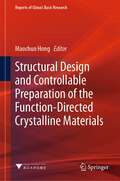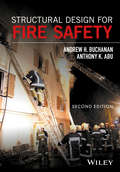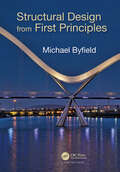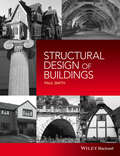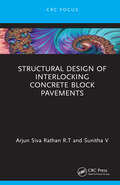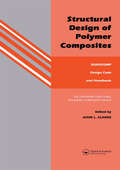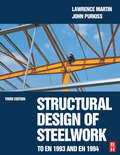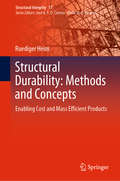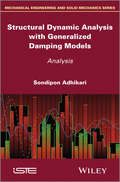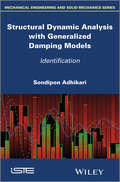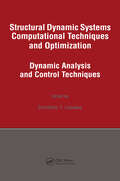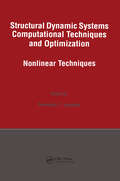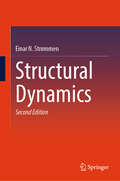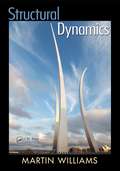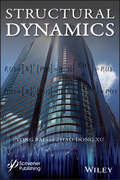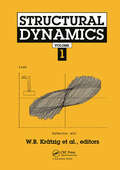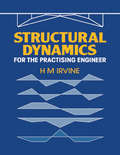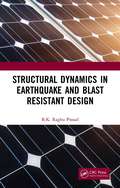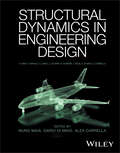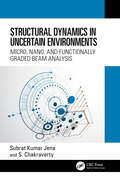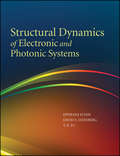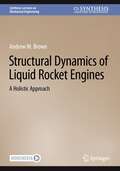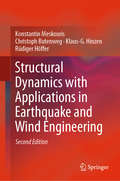- Table View
- List View
Structural Design and Controllable Preparation of the Function-Directed Crystalline Materials (Reports of China’s Basic Research)
by Maochun HongThis book presents the findings of a major research program investigating structural design and controllable preparation of function-directed crystalline materials. The program was launched by the National Natural Science Foundation of China during the 11th Five-Year Plan period, which was started in October 2008 and concluded at the end of 2016. This book first summarizes the overall scientific objectives and the current state of the art of crystalline materials research in China and the international frontier. It also focuses on exploring the relationships between structures, compositions, and properties of crystalline materials and proposes new mechanisms and models for new materials exploration. In addition, it introduces a new functional-motif theory that can guide the development of crystalline materials with optical, electrical, and other composite functions and presents new research methods for the controlled synthesis and assembly of crystalline materials, and detection and characterization of functional motifs. Furthermore, practical applications for materials such as photoelectric conversion materials, nonlinear optical materials, laser and fluorescent crystal materials, and ferroelectric and microwave dielectric materials have been described. Given its scope, this book is of interest to researchers who work in crystalline materials. It also promotes the multidisciplinary collaboration among chemistry, materials science, and physics.
Structural Design for Architects
by A NashFirst Published in 2017. An architect is not usually responsible for producing detailed structural calculations and drawings, unless the building concerned is very small and simple. Where the architect can be most effective in the field of structural design is in the clarity of the manner in which suggested solutions, in the form of schematic designs, are put to a structural engineer. It is vital that an architect can propose forms from which the structural engineer need not deviate, to the extent that the original design concept is violated. It is also important that he or she is able to make an informed and rational choice between apparently unrelated structural systems. The theme of this book therefore arises from the necessity for an architect to possess an extensive structural vocabulary, based on a clear understanding of the relevant underlying principles. Although written mainly for practising architects, it is hoped that the book will also provide a fresh perspective on the subject for building surveyors as well as for civil and structural engineers.
Structural Design for Fire Safety
by Andrew H. Buchanan Anthony Kwabena AbuStructural Design for Fire Safety, 2nd edition Andrew H. Buchanan, University of Canterbury, New Zealand Anthony K. Abu, University of Canterbury, New Zealand A practical and informative guide to structural fire engineering This book presents a comprehensive overview of structural fire engineering. An update on the first edition, the book describes new developments in the past ten years, including advanced calculation methods and computer programs. Further additions include: calculation methods for membrane action in floor slabs exposed to fires; a chapter on composite steel-concrete construction; and case studies of structural collapses. The book begins with an introduction to fire safety in buildings, from fire growth and development to the devastating effects of severe fires on large building structures. Methods of calculating fire severity and fire resistance are then described in detail, together with both simple and advanced methods for assessing and designing for structural fire safety in buildings constructed from structural steel, reinforced concrete, or structural timber. Structural Design for Fire Safety, 2nd edition bridges the information gap between fire safety engineers, structural engineers and building officials, and it will be useful for many others including architects, code writers, building designers, and firefighters. Key features: • Updated references to current research, as well as new end-of-chapter questions and worked examples. •Authors experienced in teaching, researching, and applying structural fire engineering in real buildings. • A focus on basic principles rather than specific building code requirements, for an international audience. An essential guide for structural engineers who wish to improve their understanding of buildings exposed to severe fires and an ideal textbook for introductory or advanced courses in structural fire engineering.
Structural Design from First Principles (100 Cases)
by Michael ByfieldThis enlightening textbook for undergraduates on civil engineering degree courses explains structural design from its mechanical principles, showing the speed and simplicity of effective design from first principles. This text presents good approximate solutions to complex design problems, such as "Wembley-Arch" type structures, the design of thin-walled structures, and long-span box girder bridges. Other more code-based textbooks concentrate on relatively simple member design, and avoid some of the most interesting design problems because code compliant solutions are complex. Yet these problems can be addressed by relatively manageable techniques. The methods outlined here enable quick, early stage, "ball-park" design solutions to be considered, and are also useful for checking finite element analysis solutions to complex problems. The conventions used in the book are in accordance with the Eurocodes, especially where they provide convenient solutions that can be easily understood by students. Many of the topics, such as composite beam design, are straight applications of Eurocodes, but with the underlying theory fully explained. The techniques are illustrated through a series of worked examples which develop in complexity, with the more advanced questions forming extended exam type questions. A comprehensive range of fully worked tutorial questions are provided at the end of each section for students to practice in preparation for closed book exams.
Structural Design in Building Conservation
by Dimitris TheodossopoulosNo building is properly conserved if it is not structurally sound. Consequently architects, engineers and conservation officers need an adequate grounding in the technology, the materials and the historic origins of the building in order to complete a conservation project successfully. Structural Design in Building Conservation deals with design issues and technical choices, showing how they are integrated with the planning and architectural outcomes in a conservation project. It brings together theory with current conservation technology, discussing the possibilities of structural details and strategies in architectural expression. Case studies are central to this, and these are organised around such themes as the addition of roofs, requalification of space, strengthening and re-use of fabric, repristination, additions, completions, stiffness adjustments, and the correction of past mistakes. The reader is encouraged to examine the technical details of these real projects, and explore the possible solutions. The philosophy of structural interventions is introduced in the context of conservation theories and practices in various European countries. The main types of strengthening, repairs and interventions are explained using different building types, and the structural nature of the main elements to be strengthened (linear structures, frames, plates and shells) is explored in detail. Case studies included cover a very wide range of historic types and conversions, not only monumental masonry structures like neoclassical buildings, major temples, churches, public buildings and museums, but also more utilitarian structures like historic mills, early reinforced concrete structures and vaulting types. This is essential reading for all students of architectural conservation, and practicing architects and engineers who are involved in conservation projects.
Structural Design of Buildings
by Paul SmithCovering common problems, likely failures and their remedies, this is an essential on-site guide to the behaviourof a building's structure. Presented in a clear structure and user-friendly style, the book goes through all the structural aspects of a building and assesses the importance of the different components. It explains the structural behaviour of buildings, giving some of the basics of structures together with plenty of real-life examples and guidance.
Structural Design of Interlocking Concrete Block Pavements
by Arjun Siva Rathan R.T Sunitha VThis book focuses on the structural design of Interlocking Concrete Block Pavement (ICBP) including application, analysis, design, construction, and the fundamental design concept of ICBP backed by case studies to demonstrate long- term performance of ICBP. It helps to draw conclusions regarding the various geometric properties that must be applied to achieve the performance of ICBP.Features: Promotes the use of ICBP in the construction of pavements. Provides a comprehensive overview of concrete block paving. Discusses specifications from codes like ASCE 58- 16, ASTM, BS and IRC codes and datasets online. Includes chapters on choosing the materials and designing the type and the shape of the concrete block and the thickness of all layers of the pavement. Lists appropriate stipulated values for the various geometric properties. Aids in understanding the history and comprehensive application of ICBP. This book is aimed at graduate students and researchers in pavement and civil engineering.
Structural Design of Polymer Composites: Eurocomp Design Code and Background Document
by John L. ClarkeIndependent, practical guidance on the structural design of polymer composites is provided for the first time in this book. Structural designers familiar with design of conventional structural materials such as steel and concrete will be able to use it to design a broad range of polymeric composites for structural applications, using glass fibre reinforced plastic materials, components, connections and assemblies.
Structural Design of Steelwork to EN 1993 and EN 1994
by John Purkiss Lawrence MartinThis is a solid introduction to design to the new Eurocode specification for civil and structural engineering students, technicians and professionals. It covers Eurocode 3 on steel and Eurocode 4 on composite structures, using worked examples, and provides introduction to principles and practical guidance on compliance.
Structural Durability: Enabling Cost and Mass Efficient Products (Structural Integrity #17)
by Ruediger HeimThis book provides methods and concepts which enable engineers to design mass and cost efficient products. Therefore, the book introduces background and motivation related to sustainability and lightweight design by looking into those aspects from a durability and quality point of view. Hence this book gives a "top-down" approach: What does an engineer has to do for providing a mass and cost efficient solution? A central part of that approach is the "stress-strength interference model" and how to deal with "stresses" (caused by operational loads) as well as with the "strength" of components (provided by material, design and manufacturing process). The basic concepts of material fatigue are introduced, but the focus of the volume is to develop an understanding of the content and sequence of engineering tasks to be performed which help to build reliable products. This book is therefore aimed specifically at students of mechanical engineering and mechatronics and at engineers in professional practice.
Structural Dynamic Analysis with Generalized Damping Models: Analysis (Wiley-iste Ser.)
by Sondipon AdhikariSince Lord Rayleigh introduced the idea of viscous damping in his classic work "The Theory of Sound" in 1877, it has become standard practice to use this approach in dynamics, covering a wide range of applications from aerospace to civil engineering. However, in the majority of practical cases this approach is adopted more for mathematical convenience than for modeling the physics of vibration damping. Over the past decade, extensive research has been undertaken on more general "non-viscous" damping models and vibration of non-viscously damped systems. This book, along with a related book Structural Dynamic Analysis with Generalized Damping Models: Identification, is the first comprehensive study to cover vibration problems with general non-viscous damping. The author draws on his considerable research experience to produce a text covering: dynamics of viscously damped systems; non-viscously damped single- and multi-degree of freedom systems; linear systems with non-local and non-viscous damping; reduced computational methods for damped systems; and finally a method for dealing with general asymmetric systems. The book is written from a vibration theory standpoint, with numerous worked examples which are relevant across a wide range of mechanical, aerospace and structural engineering applications. Contents 1. Introduction to Damping Models and Analysis Methods.2. Dynamics of Undamped and Viscously Damped Systems.3. Non-Viscously Damped Single-Degree-of-Freedom Systems.4. Non-viscously Damped Multiple-Degree-of-Freedom Systems.5. Linear Systems with General Non-Viscous Damping.6. Reduced Computational Methods for Damped Systems
Structural Dynamic Analysis with Generalized Damping Models: Identification (Wiley-iste Ser.)
by Sondipon AdhikariSince Lord Rayleigh introduced the idea of viscous damping in his classic work "The Theory of Sound" in 1877, it has become standard practice to use this approach in dynamics, covering a wide range of applications from aerospace to civil engineering. However, in the majority of practical cases this approach is adopted more for mathematical convenience than for modeling the physics of vibration damping. Over the past decade, extensive research has been undertaken on more general “non-viscous” damping models and vibration of non-viscously damped systems. This book, along with a related book Structural Dynamic Analysis with Generalized Damping Models: Analysis, is the first comprehensive study to cover vibration problems with general non-viscous damping. The author draws on his considerable research experience to produce a text covering: parametric senistivity of damped systems; identification of viscous damping; identification of non-viscous damping; and some tools for the quanitification of damping. The book is written from a vibration theory standpoint, with numerous worked examples which are relevant across a wide range of mechanical, aerospace and structural engineering applications. Contents 1. Parametric Sensitivity of Damped Systems. 2. Identification of Viscous Damping. 3. Identification of Non-viscous Damping. 4. Quantification of Damping. About the Authors Sondipon Adhikari is Chair Professor of Aerospace Engineering at Swansea University, Wales. His wide-ranging and multi-disciplinary research interests include uncertainty quantification in computational mechanics, bio- and nanomechanics, dynamics of complex systems, inverse problems for linear and nonlinear dynamics, and renewable energy. He is a technical reviewer of 97 international journals, 18 conferences and 13 funding bodies.He has written over 180 refereed journal papers, 120 refereed conference papers and has authored or co-authored 15 book chapters.
Structural Dynamic Systems Computational Techniques and Optimization: Dynamic Analysis and Control Techniques (Gordon and Breach International Series in Engineering, Technolo)
by Cornelius T. LeondesThere are various techniques to optimize either structural parameters, or structural controllers, but there are not many techniques that can simultaneously optimize the structural parameters and controller. The advantage of integrating the structural and controller optimization problems is that structure and controller interaction is taken into account in the design process and a more efficient overall design (lower control force/lighter weight) can be achieved, and also multidisciplinary design optimization can be performed. The down side is that the combined optimization problem is more difficult to formulate and solve, and computations are increased. This volume is a comprehensive treatment of dynamic analysis and control techniques in structural dynamic systems and the wide variety of issues and techniques that fall within this broad area, including the interactions between structural control systems and structural system parameters.
Structural Dynamic Systems Computational Techniques and Optimization: Nonlinear Techniques (Gordon and Breach International Series in Engineering, Technolo)
by Cornelius T. LeondesNonlinear structural dynamic systems which are multi-degree of freedom systems involve, for instance, matrix dynamic equilibrium equations, which can be of various order up to very high order. In these equations, the nonlinear quantities can be dependent on time and other terms, such as scalar variables, which are dependent on time. Frequency response and response time derivatives would also, of course, be involved. Nonlinear terms can account for dissipative phenomena and can be due to other physical phenomena. In fact, many engineering structures involve time-dependent properties such as, stiffness elements of specific structural components which can change according to the stress level. Other examples of dynamic elements of nonlinear structural systems can include system mass and damping distribution elements which evolve with time, such as railway or highway bridges and other structures, which interact with external agencies generating the system motion (for example, trains, a queue of vehicles, or other external agencies.) This volume is a rather comprehensive treatment of many of the techniques and methods which are utilized for the analysis of nonlinear structural dynamic systems.
Structural Dynamics
by Einar N. StrømmenThe first part of this book covers the general theory of structural dynamics, in a calculous format as well as a finite element formulation. Secondly, it contains methods of eigenvalue calculations of civil engineering structural systems. And third, it contains a major part covering dynamic displacement response calculations as induced by earthquake, turbulent wind, vortex shedding and moving vehicles, enabling the designer to evaluate structural safety from the effects of fluctuating internal forces.The general theory contains comprehensive development of the principle of virtual displacements, as well as the Galerkin solution to eigenvalue problems. A separate chapter has been dedicated to the suspension bridge. The theory of single or multiple tuned mass dampers is included, a theory not presented elsewhere.The book contains a chapter covering the theory of structural damping, as well as comprehensive data of the structural damping properties that are necessary forany dynamic response calculation. The book is intended for students as well as practising engineers. It contains numerous relevant examples, covering numerical solutions that are well suited for computer programming.
Structural Dynamics
by Martin WilliamsDynamics is increasingly being identified by consulting engineers as one of the key skills which needs to be taught in civil engineering degree programs. This is driven by the trend towards lighter, more vibration-prone structures, the growth of business in earthquake regions, the identification of new threats such as terrorist attack and the increased availability of sophisticated dynamic analysis tools.Martin Williams presents this short, accessible introduction to the area of structural dynamics. He begins by describing dynamic systems and their representation for analytical purposes. The two main chapters deal with linear analysis of single (SDOF) and multi-degree-of-freedom (MDOF) systems, under free vibration and in response to a variety of forcing functions. Hand analysis of continuous systems is covered briefly to illustrate the key principles. Methods of calculation of non-linear dynamic response is also discussed. Lastly, the key principles of random vibration analysis are presented – this approach is crucial for wind engineering and is increasingly important for other load cases. An appendix briefly summarizes relevant mathematical techniques. Extensive use is made of worked examples, mostly drawn from civil engineering (though not exclusively – there is considerable benefit to be gained from emphasizing the commonality with other branches of engineering). This introductory dynamics textbook is aimed at upper level civil engineering undergraduates and those starting an M.Sc. course in the area.
Structural Dynamics
by Yong BaiAcross many disciplines of engineering, dynamic problems of structures are a primary concern. Civil engineers, mechanical engineers, aircraft engineers, ocean engineers, and engineering students encounter these problems every day, and it is up to them systematically to grasp the basic concepts, calculation principles and calculation methods of structural dynamics. This book focuses on the basic theories and concepts, as well as the application and background of theories and concepts in engineering. Since the basic principles and methods of dynamics are applied to other various engineering fields, this book can also be used as a reference for practicing engineers in the field across many multiple disciplines and for undergraduate and graduate students in other majors as well. The main contents include basic theory of dynamics, establishment of equation of motion, single degree of freedom systems, multi-degree of freedom systems, distributed-parameter systems, stochastic structural vibrations, research projects of structural dynamics, and structural dynamics of marine pipeline and risers. Whether for the veteran engineer or student, this is a must-have for any scientific or engineering library.
Structural Dynamics - Vol 1: Proceedings Of The First European Conference On Structural Dynamics (eurodyne 90) Held At The Ruhr University, Bochum, Frg In June 1990
by O. T. Bruhns W. B. Krätzig H. L. Jessberger K. Meskouris H. J. Niemann G. Schmid F. Stangenberg A. N. Kounadis G. I. SchuëllerFirst published in 1991. This volume contains the proceedings of the first European Conference on Structural Dynamics (Eurodyne 90) held at the Ruhr University, Bochum, FRG in June 1990. Volume one (169-9) covers impact, dynamic stability, soil dynamics, system identification, earthquake engineering, earthquake engineering R/C structures, and earthquake engineering for steel structures.
Structural Dynamics for the Practising Engineer
by H.M. IrvineStructural dynamics is a complex and increasingly important field of civil/structural engineering. The aim of this concise book is to demonstrate to practising engineers and advanced students that the dynamic response of structural systems can be understood without advanced techniques of analysis and impenetrable detail.
Structural Dynamics in Earthquake and Blast Resistant Design
by BK Raghu PrasadFocusing on the fundamentals of structural dynamics required for earthquake blast resistant design, Structural Dynamics in Earthquake and Blast Resistant Design initiates a new approach of blending a little theory with a little practical design in order to bridge this unfriendly gap, thus making the book more structural engineer-friendly. This is attempted by introducing the equations of motion followed by free and forced vibrations of SDF and MDF systems, D’Alembert’s principle, Duhammel’s integral, relevant impulse, pulse and sinusoidal inputs, and, most importantly, support motion and triangular pulse input required in earthquake and blast resistant designs, respectively. Responses of multistorey buildings subjected to earthquake ground motion by a well-known mode superposition technique are explained. Examples of real-size structures as they are being designed and constructed using the popular ETABS and STAAD are shown. Problems encountered in such designs while following the relevant codes of practice like IS 1893 2016 due to architectural constraints are highlighted. A very difficult constraint is in avoiding torsional modes in fundamental and first three modes, the inability to get enough mass participation, and several others. In blast resistant design the constraint is to model the blast effects on basement storeys (below ground level). The problem is in obtaining the attenuation due to the soil. Examples of inelastic hysteretic systems where top soft storey plays an important role in expending the input energy, provided it is not below a stiffer storey (as also required by IS 1893 2016), and inelastic torsional response of structures asymmetric in plan are illustrated in great detail. In both cases the concept of ductility is explained in detail. Results of response spectrum analyses of tall buildings asymmetric in plan constructed in Bengaluru using ETABS are mentioned. Application of capacity spectrum is explained and illustrated using ETABS for a tall building. Research output of retrofitting techniques is mentioned. Response spectrum analysis using PYTHON is illustrated with the hope that it could be a less expensive approach as it is an open source code. A new approach of creating a fictitious (imaginary) boundary to obtain blast loads on below-ground structures devised by the author is presented with an example. Aimed at senior undergraduates and graduates in civil engineering, earthquake engineering and structural engineering, this book: Explains in a simple manner the fundamentals of structural dynamics pertaining to earthquake and blast resistant designIllustrates seismic resistant designs such as ductile design philosophy and limit state design with the use of capacity spectrumDiscusses frequency domain analysis and Laplace transform approach in detailExplains solutions of building frames using software like ETABS and STAADCovers numerical simulation using a well-known open source tool PYTHON
Structural Dynamics in Engineering Design
by Alex Carrella Keith Worden Jonathan E. Cooper Dario Di Maio Nuno M. M. Maia Francesco Marulo Chaoping Zang Tiago A. N. SilvaWorld-class authors describe and illustrate how structural dynamics is applied to the engineering design process Structural Dynamics in Engineering Design covers the fundamentals of structural dynamics and its application to the engineering design process, providing all of the necessary information to implement an optimal design process. Each of its seven chapters is written by an expert in the field and provides the reader with the structural dynamic theoretical background and its more practical aspects for the implementation of an advanced design capability. The first three chapters are dedicated to the underlying theory of the three main processes: the fundamentals of vibration theory, the basis of experimental dynamics and the main numerical analysis tools (including reference to the finite element method). Having laid the foundation of the design philosophy, the following three chapters present the reader with the three disciplines of identification, nonlinear analysis and validation/updating. The final chapter presents some applications of the approach to real and complex engineering cases. Key features: Takes a multi-disciplinary approach and contains critical information on theory, testing and numerical analysis for structural dynamics. Includes a chapter on industrial applications (including aircraft design and ground vibration testing), which illustrates the design process and explains how structural dynamics is applied at different stages. The book is a must-have for researchers and practitioners in mechanical and aerospace engineering (in particular test engineers, CAE analysts and structural dynamicists), as well as graduate students in mechanical and aerospace engineering departments.
Structural Dynamics in Uncertain Environments: Micro, Nano, and Functionally Graded Beam Analysis
by S. Chakraverty Subrat Kumar JenaThe uncertainties or randomness of the material properties of structural components are of serious concern to engineers. Structural analysis is usually done by taking into account only deterministic or crisp parameters; however, building materials can have the aspects of uncertainty. The causes of this uncertainty or randomness are defects in atomic configurations, measurement errors, environmental conditions, and other factors. The influence of uncertainties is more profound for nanoscale and microstructures due to their small-scale effects. Several nanoscale experiments and molecular dynamics studies also support the claim of possible attachment of randomness for various parameters. With regard to these concerns, it is necessary to propose new models that specifically integrate and effectively overcome imprecisely defined parameters of the system.Structural Dynamics in Uncertain Environments presents the uncertainty modeling of nanobeams, microbeams, and Funtionally Graded (FG) beams using non-probabilistic approaches which include interval and fuzzy concepts. Vibration and stability analyses of the beams are conducted using different analytical, semi-analytical, and numerical methods for finding exact and/or approximate solutions of governing equations arising in uncertain environments. In this context, this book addresses structural uncertainties and investigates the dynamic behavior of micro-, nano-, and FG beams. Examines the concepts of fuzzy uncertain environments in structural dynamics Presents comprehensive analysis of propagation of uncertainty in vibration and buckling analyses Explains efficient mathematical methods to handle uncertainties in the governing equations
Structural Dynamics of Electronic and Photonic Systems
by Ephraim Suhir T. X. Yu David S. SteinbergThe proposed book will offer comprehensive and versatile methodologies and recommendations on how to determine dynamic characteristics of typical micro- and opto-electronic structural elements (printed circuit boards, solder joints, heavy devices, etc.) and how to design a viable and reliable structure that would be able to withstand high-level dynamic loading. Particular attention will be given to portable devices and systems designed for operation in harsh environments (such as automotive, aerospace, military, etc.) In-depth discussion from a mechanical engineer's viewpoint will be conducted to the key components' level as well as the whole device level. Both theoretical (analytical and computer-aided) and experimental methods of analysis will be addressed. The authors will identify how the failure control parameters (e.g. displacement, strain and stress) of the vulnerable components may be affected by the external vibration or shock loading, as well as by the internal parameters of the infrastructure of the device. Guidelines for material selection, effective protection and test methods will be developed for engineering practice.
Structural Dynamics of Liquid Rocket Engines: A Holistic Approach (Synthesis Lectures on Mechanical Engineering)
by Andrew M. BrownThis is the first Structural Dynamics book focused on this indispensable aspect of liquid rocket engine design. This book begins by reviewing basic concepts in Structural Dynamics, including the free and forced response of SDOF and MDOF systems, along with some discussion of how numerical solutions are generated. The book then moves to a discussion of specific applications of these techniques in LREs, progressing from component level (turbomachinery and combustion devices), up through engine system models, and finally to integration with a launch vehicle. Clarifies specific topics including the Campbell and SAFE Diagrams for resonance identification in turbomachinery, the complications of component analysis in the pump side due to a host of complication factors such as acoustic/structure interaction, the "side-loads" fluid/structure interaction problem in overexpanded rocket nozzles, and competing methods for generation overall engine system interface loads. Includes specific examples for illustration while closing with rotordynamic analysis, dynamic data analysis, and vibroacoustics.
Structural Dynamics with Applications in Earthquake and Wind Engineering
by Konstantin Meskouris Christoph Butenweg Klaus-G. Hinzen Rüdiger HöfferThis book offers a comprehensive introduction to the theory of structural dynamics, highlighting practical issues and illustrating applications with a large number of worked out examples. In the spirit of “learning by doing” it encourages readers to apply immediately these methods by means of the software provided, allowing them to become familiar with the broad field of structural dynamics in the process.The book is primarily focused on practical applications. Earthquake resistant design is presented in a holistic manner, discussing both the underlying geophysical concepts and the latest engineering design methods and illustrated by fully worked out examples based on the newest structural codes. The spectral characteristics of turbulent wind processes and the main analysis methods in the field of structural oscillations due to wind gusts and vortex shedding are also discussed and applications illustrated by realistic examples of slender chimney structures. The user‐friendly software employed is downloadable and can be readily used by readers to tackle their own problems.
